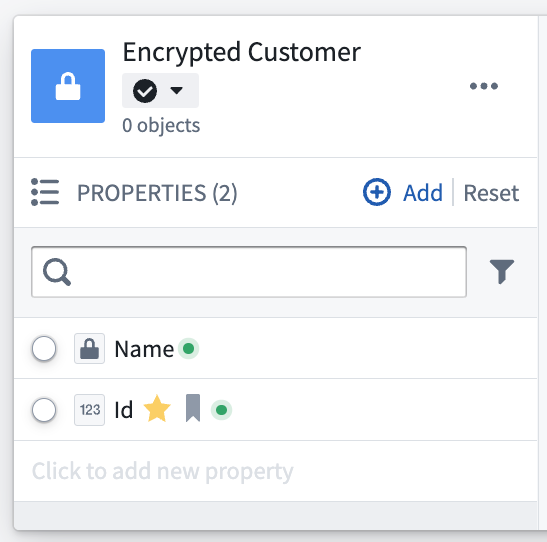Use CipherText properties in Functions and Actions
Use of Cipher in Functions requires an Operational User License. If checkpoints are configured for this operation (hashing, encrypting, decrypting), the license must be allowed to bypass checkpoints.
Functions code repositories can be used to interact with CipherText object properties, enabling sophisticated logic like bulk encryption or bulk decryption. To get started with Functions, see this tutorial.
For the examples below assume we have an EncryptedCustomer object with the following properties:
- An encrypted CipherText
name - A unique, unencrypted integer
id
We will be writing two functions to interact with this object:
decryptEncryptedCustomer()will take in anEncryptedCustomerobject and return the plaintext name.updateEncryptedName()will take in anEncryptedCustomerobject and anewNameand update the encrypted name of that object to thenewName.

Decrypting CipherText Properties in Functions
In this example we decrypt and return the name property of an EncryptedCustomer object.
Copied!1 2 3 4 5 6 7import { Function, Integer, OntologyEditFunction, Edits } from "@foundry/functions-api"; import { Objects, EncryptedCustomers } from "@foundry/ontology-api"; @Function() public async decryptEncryptedCustomer(customer: EncryptedCustomers): Promise<string | undefined> { return await customer.name?.decryptAsync(); }
Updating CipherText Properties in Functions
In the example below, we update the name property of an EncryptedCustomer object. Note that the function in this example, like any function that updates objects, must be annotated with @OntologyEditFunction() and @Edits(EncryptedCustomers). Also note that running this function in preview will not actually edit the object.
Copied!1 2 3 4 5 6 7 8import { Function, Integer, OntologyEditFunction, Edits } from "@foundry/functions-api"; import { Objects, EncryptedCustomers } from "@foundry/ontology-api"; @OntologyEditFunction() @Edits(EncryptedCustomers) public async updateEncryptedName(customer: EncryptedCustomers, newName: string): Promise<void> { await customer.name?.updateAsync(newName); }